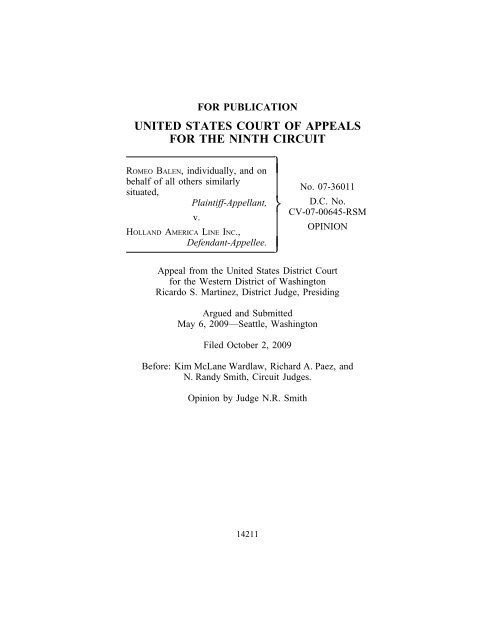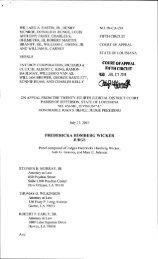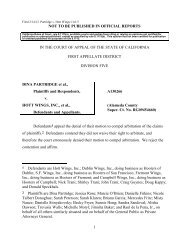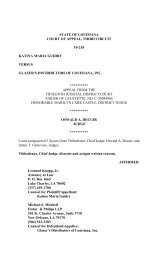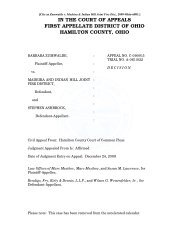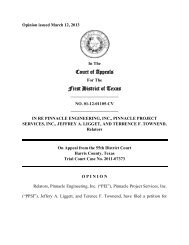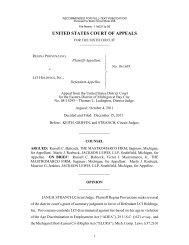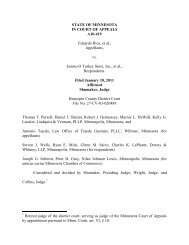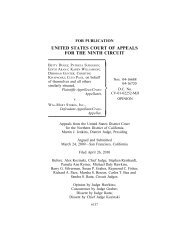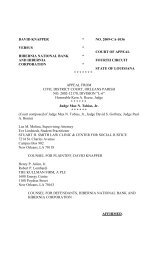BALEN v. HOLLAND AMERICA LINE - LawMemo
BALEN v. HOLLAND AMERICA LINE - LawMemo
BALEN v. HOLLAND AMERICA LINE - LawMemo
You also want an ePaper? Increase the reach of your titles
YUMPU automatically turns print PDFs into web optimized ePapers that Google loves.
FOR PUBLICATION<br />
UNITED STATES COURT OF APPEALS<br />
FOR THE NINTH CIRCUIT<br />
ROMEO <strong>BALEN</strong>, individually, and on<br />
behalf of all others similarly<br />
situated,<br />
Plaintiff-Appellant,<br />
v.<br />
<strong>HOLLAND</strong> <strong>AMERICA</strong> <strong>LINE</strong> INC.,<br />
Defendant-Appellee.<br />
No. 07-36011<br />
D.C. No.<br />
CV-07-00645-RSM<br />
OPINION<br />
Appeal from the United States District Court<br />
for the Western District of Washington<br />
Ricardo S. Martinez, District Judge, Presiding<br />
Argued and Submitted<br />
May 6, 2009—Seattle, Washington<br />
Filed October 2, 2009<br />
Before: Kim McLane Wardlaw, Richard A. Paez, and<br />
N. Randy Smith, Circuit Judges.<br />
Opinion by Judge N.R. Smith<br />
14211
14214 <strong>BALEN</strong> v. <strong>HOLLAND</strong> <strong>AMERICA</strong> <strong>LINE</strong><br />
COUNSEL<br />
Gregory M. Miller, Reed, Longyear, Malnati & Ahrens,<br />
PLLC, Seattle, Washington, for the plaintiff-appellant.<br />
Stephen R. Rummage and Roger A. Leishman, Davis Wright<br />
Tremaine LLP, Seattle, Washington, for the defendantappellee.<br />
N.R. SMITH, Circuit Judge:<br />
OPINION<br />
Romeo Balen, individually and on behalf of those similarly<br />
situated, appeals the district court’s order granting Holland
<strong>BALEN</strong> v. <strong>HOLLAND</strong> <strong>AMERICA</strong> <strong>LINE</strong><br />
America Line Inc.’s (“HAL”) motion to compel arbitration.<br />
Balen contends that his claims cannot be resolved through<br />
arbitration, because (1) United States law does not permit the<br />
arbitration of claims brought under the Seamen’s Wage Act,<br />
46 U.S.C. § 10313 (“Wage Act”) and (2) a valid arbitration<br />
agreement did not cover his claims against HAL. We have<br />
jurisdiction pursuant to 28 U.S.C. § 1291, and we affirm.<br />
Claims under the Wage Act are subject to arbitration pursuant<br />
to the United Nations Convention on the Recognition and<br />
Enforcement of Foreign Arbitral Awards (“Convention”).<br />
United Nations Convention on the Recognition and Enforcement<br />
of Foreign Arbitral Awards, art. II, Dec. 29, 1970, 21<br />
U.S.T. 2517 [hereinafter Convention]. Balen was subject to an<br />
arbitration agreement contained in the Collective Bargaining<br />
Agreement between his union and his employer. This arbitration<br />
agreement was valid and enforceable under the Convention.<br />
I. BACKGROUND<br />
14215<br />
The Philippine Overseas Employment Administration<br />
(“POEA”), a division of the Department of Labor and<br />
Employment of the Republic of the Philippines, closely regulates<br />
the employment of Filipino seamen by foreign corporations.<br />
Foreign employers must go through a POEA-licensed<br />
employment agency to hire workers. The POEA approves and<br />
administers standard employment contracts of the Filipino<br />
seamen. The POEA-approved contracts include the POEA’s<br />
Standard Terms and Conditions Governing the Employment<br />
of Filipino Seafarers On Board Ocean Going Vessels<br />
(“Standard Terms”).<br />
Section 3 of the Standard Terms, titled “Free Passage from<br />
the Point of Hire to the Port of Embarkation” states: “[t]he<br />
seafarer shall join the vessel or be available for duty at the<br />
date and time specified by the employer. The seafarer shall
14216 <strong>BALEN</strong> v. <strong>HOLLAND</strong> <strong>AMERICA</strong> <strong>LINE</strong><br />
travel by air or as otherwise directed at the expense of the<br />
employer.”<br />
Section 29 of the Standard Terms concerns “Dispute Settlement<br />
Procedures.” It states:<br />
In cases of claims and disputes arising from this<br />
employment, the parties covered by a collective bargaining<br />
agreement shall submit the claim or dispute<br />
to the original and exclusive jurisdiction of the voluntary<br />
arbitrator or panel of arbitrators. If the parties<br />
are not covered by a collective bargaining agreement,<br />
the parties may at their option submit the<br />
claim or dispute to either the original and exclusive<br />
jurisdiction of the National Labor Relations Commission<br />
(NLRC), pursuant to Republic Act of 1995<br />
or to the original and exclusive jurisdiction of the<br />
voluntary arbitrator or panel of arbitrators. If there is<br />
no provision as to the voluntary arbitrators to be<br />
appointed by the parties, the same shall be appointed<br />
from the accredited voluntary arbitrators of the<br />
National Conciliation and Mediation Board of the<br />
Department of Labor and Employment.<br />
Arbitration of all claims by Filipino overseas seafarers is an<br />
integral part of the POEA’s mandate to promote and monitor<br />
the overseas employment of Filipinos and safeguard their<br />
interests.<br />
In 2004, HAL drafted a Gratuity and Beverage Service<br />
Charge Plan (“Gratuity Plan”), under which it would bill passengers<br />
for a daily gratuity charge. Under the Gratuity Plan,<br />
employees would have the right to share in the gratuities<br />
charged to passengers. HAL guaranteed a minimum gratuity<br />
amount for each person, regardless of actual payment by passengers.<br />
With the increased gratuity compensation, HAL set<br />
a lower base pay rate. This Gratuity Plan also included a provision<br />
that required participants to reimburse HAL in monthly
<strong>BALEN</strong> v. <strong>HOLLAND</strong> <strong>AMERICA</strong> <strong>LINE</strong><br />
14217<br />
installments for deployment costs, including travel expenses<br />
incurred by HAL, in qualifying these seafarers to work overseas.<br />
Under this plan, participants would earn more than they<br />
received previously.<br />
Because the Gratuity Plan modified the existing collective<br />
bargaining agreement (“CBA”) between HAL and the Filipino<br />
seamen’s union (Associated Marine Officers’ and Seamen’s<br />
Union of the Philippines (“AMOSUP”)), HAL, acting<br />
through its agent, United Philippine Lines, Inc. (“UPL”), a<br />
POEA-licensed employment agency, entered into negotiations<br />
regarding its Gratuity Plan with AMOSUP. AMOSUP represented<br />
Balen and other Filipino seafarers. Under Philippine<br />
law, AMOSUP could enter into such agreements without<br />
POEA’s approval if the benefits were greater than those provided<br />
in the Standard Terms. The CBA was approved by<br />
AMOSUP, and AMOSUP also submitted the CBA to the<br />
POEA, who marked it with a “received” stamp and the<br />
attached payscale with an “approved” stamp.<br />
Balen was employed by HAL from September 2005<br />
through March 2006 as a beverage attendant. Before he left<br />
the Philippines in September 2005, Balen signed a document<br />
acknowledging the terms of the Gratuity Plan. Balen could<br />
not, however, fully afford to pay the $2,119 travel expenses<br />
in the time frame demanded by HAL. Balen was therefore<br />
discharged in March 2006.<br />
On April 27, 2007, Balen filed suit in U.S. District Court<br />
for the Western District of Washington, claiming that HAL<br />
(1) breached its contract when it required him to pay travel<br />
expenses and (2) violated the Wage Act. HAL moved to compel<br />
arbitration and dismiss Balen’s complaint pursuant to Rule<br />
12(b)(3) of the Federal Rules of Civil Procedure. The district<br />
court granted the motion, finding that Balen’s Wage Act<br />
claims were subject to arbitration under the Convention. The<br />
district court also found that (1) the CBA covered Balen’s
14218 <strong>BALEN</strong> v. <strong>HOLLAND</strong> <strong>AMERICA</strong> <strong>LINE</strong><br />
claims against HAL and (2) Section 29 of the Standard Terms<br />
made his claims subject to arbitration.<br />
II. DISCUSSION<br />
We review de novo the district court’s decision to grant or<br />
deny a motion to compel arbitration. Bushley v. Credit Suisse<br />
First Boston, 360 F.3d 1149, 1152 (9th Cir. 2004). The underlying<br />
factual findings are reviewed for clear error. See Ticknor<br />
v. Choice Hotels Int’l, Inc., 265 F.3d 931, 936 (9th Cir. 2001).<br />
Balen contends the district court erred in compelling arbitration,<br />
because (1) the Convention does not apply to Wage Act<br />
claims and (2) the arbitration agreement is invalid. We disagree.<br />
A. The Convention requires enforcement of arbitration<br />
agreements.<br />
[1] It is well-settled that “questions of arbitrability must be<br />
addressed with a healthy regard for the federal policy favoring<br />
arbitration.” Moses H. Cone Mem’l Hosp. v. Mercury Constr.<br />
Corp., 460 U.S. 1, 24 (1983). “[A]ny doubts concerning the<br />
scope of arbitrable issues should be resolved in favor of arbitration<br />
. . . .” Id. at 24-25. The Supreme Court has consistently<br />
recognized “the emphatic federal policy in favor of arbitral<br />
dispute resolution,” a policy that “applies with special force<br />
in the field of international commerce.” Mitsubishi Motors<br />
Corp. v. Soler Chrysler-Plymouth, Inc., 473 U.S. 614, 631<br />
(1985). Article II(1) of the Convention also recognizes the<br />
importance of arbitral resolution. It provides that “[e]ach Contracting<br />
State shall recognize an agreement in writing under<br />
which the parties undertake to submit to arbitration all or any<br />
differences which have arisen or which may arise between<br />
them in respect of a defined legal relationship, whether contractual<br />
or not, concerning a subject matter capable of settlement<br />
by arbitration.” Convention, supra, art. II.
<strong>BALEN</strong> v. <strong>HOLLAND</strong> <strong>AMERICA</strong> <strong>LINE</strong><br />
1. The Federal Arbitration Act’s Exemption Clause<br />
Balen contends that the district court erred in granting<br />
HAL’s motion to compel arbitration, because the Federal<br />
Arbitration Act (FAA) exempts foreign arbitration agreements<br />
that would otherwise be covered by the Convention. We disagree.<br />
[2] Like the Convention, 9 U.S.C. § 202, the FAA applies<br />
to maritime contracts in commerce. Unlike the Convention,<br />
the FAA includes a provision exempting “contracts of<br />
employment of seamen” from domestic arbitration. 9 U.S.C.<br />
§§ 1, 2. However, in Rogers v. Royal Caribbean Cruise Line,<br />
547 F.3d 1148, 1154 (9th Cir. 2008), we addressed whether<br />
the FAA’s exemption clause “applies to arbitration agreements<br />
that would, in the absence of the exemption clause, be<br />
covered by the Convention.” We held that it did not. Id. Rogers<br />
is controlling on this issue, and we are bound to follow it.<br />
See, e.g., Miller v. Gammie, 335 F.3d 889, 899 (9th Cir. 2003)<br />
(en banc).<br />
2. 46 U.S.C. § 10313<br />
14219<br />
Balen contends the district court erred in compelling arbitration,<br />
because U.S. Bulk Carriers, Inc. v. Arguelles, 400<br />
U.S. 351 (1971), prohibits arbitration agreements from divesting<br />
courts of jurisdiction over seafarer wage disputes under 46<br />
U.S.C. § 10313. He argues that § 10313 provides that the<br />
courts are available to seamen to enforce the rights guaranteed<br />
by this section. In Arguelles, the Supreme Court concluded<br />
that individual seamen could choose between pursuing arbitral<br />
or judicial remedies, because Congress had not clearly<br />
made arbitration mandatory. Arguelles, 400 U.S. at 357-58.<br />
Again, Rogers precludes this argument. After reviewing<br />
Arguelles and the provisions under 46 U.S.C. § 10313, we<br />
held in Rogers that the Convention “specifically and expressly<br />
compels federal courts to enforce arbitration agreements.
14220 <strong>BALEN</strong> v. <strong>HOLLAND</strong> <strong>AMERICA</strong> <strong>LINE</strong><br />
Therefore, Arguelles does not alter our conclusion that the<br />
exemption clause does not apply to the Convention Act.”<br />
Rogers, 547 F.3d at 1157. Accordingly, Arguelles does not<br />
preclude enforcement of the arbitration agreement under the<br />
Convention.<br />
3. 46 U.S.C. § 10317<br />
[3] Balen contends that the arbitration agreement is void<br />
under 46 U.S.C. § 10317. Section 10317 provides:<br />
A master or seaman by any agreement other than one<br />
provided for in this chapter may not forfeit the master’s<br />
or seaman’s lien on the vessel or be deprived of<br />
a remedy to which the master or seaman otherwise<br />
would be entitled for the recovery of wages. A stipulation<br />
in an agreement inconsistent with this chapter,<br />
or a stipulation by which a seaman consents to abandon<br />
a right to wages if the vessel is lost, or to abandon<br />
a right the seaman may have or obtain in the<br />
nature of salvage, is void.<br />
Balen argues that the arbitration agreement is void, because<br />
it requires him to abandon his Wage Act rights. We disagree.<br />
[4] First, this provision does not apply to foreign vessels.<br />
Section 10301(c) specifically states that “unless otherwise<br />
provided, this chapter does not apply to a foreign vessel.”<br />
While other provisions of the Merchant Seamen Protection<br />
and Relief Act specifically state when they apply to foreign<br />
vessels, § 10317 does not. See, e.g., 46 U.S.C. § 10313(i)<br />
(“This section applies to a seaman on a foreign vessel when<br />
in a harbor of the United States.”). Balen argues that the legislative<br />
history of the Merchant Seamen Relief and Protection<br />
Act indicates that § 10317 applies to seamen on foreign vessels<br />
when harbored in the United States. However, because<br />
this statute is unambiguous, we need not look to legislative<br />
history and consider these arguments. See North Dakota v.
United States, 460 U.S. 300, 312 (1983) (noting that if the<br />
statutory language is clear and unambiguous “that language<br />
must ordinarily be regarded as conclusive.” (citation and<br />
internal quotation marks omitted)).<br />
[5] Second, there is nothing in the record indicating that<br />
Balen would forfeit or be deprived of any substantive rights<br />
by arbitration because, as explained below, he may bring his<br />
Wage Act claims in the arbitration proceedings. Accordingly,<br />
we hold that § 10317 does not invalidate Balen’s arbitration<br />
agreement.<br />
4. Public Policy<br />
<strong>BALEN</strong> v. <strong>HOLLAND</strong> <strong>AMERICA</strong> <strong>LINE</strong><br />
14221<br />
Balen contends that the arbitration provision is null and<br />
void because it is contrary to public policy. Balen argues that,<br />
by ordering arbitration, the court would eliminate a significant<br />
and protected component of his seafarer’s wages, effectively<br />
voiding Congress’s intent to ensure proper treatment of seamen<br />
(a class for which Congress enacted comprehensive legislation).<br />
Again, we disagree.<br />
[6] The Convention requires that courts must enforce an<br />
agreement to arbitrate unless the agreement is “null and void,<br />
inoperative or incapable of being performed.” Mitsubishi<br />
Motors, 473 U.S. at 619 n.3 (quoting 21 U.S.T. at 2519 (citing<br />
9 U.S.C. § 203 (conferring federal jurisdiction over Convention<br />
claims))). Like the Supreme Court, id. at 631, we also<br />
have recognized “the strong public policy favoring arbitration,”<br />
including international arbitration. Lozano v. AT&T<br />
Wireless Servs., Inc., 504 F.3d 718, 726 (9th Cir. 2007).<br />
Given this strong public policy, Balen must show that the<br />
public policy regarding the proper treatment of seafarers is<br />
stronger than the public policy favoring the arbitration. See<br />
Rogers, 547 F.3d at 1159. Balen has failed to meet this burden.<br />
[7] First, Balen has not established what statutory remedy<br />
or procedure he could pursue in the United States that he
14222 <strong>BALEN</strong> v. <strong>HOLLAND</strong> <strong>AMERICA</strong> <strong>LINE</strong><br />
could not pursue in the Philippines. There is no reason to conclude<br />
that Philippine arbitrators could not consider an action<br />
arising under the Wage Act. See Lim v. Offshore Specialty<br />
Fabricators, Inc., 404 F.3d 898, 908 (5th Cir. 2005). Balen<br />
has failed to establish that he could not pursue any of his statutory<br />
claims in an arbitration proceeding in the Philippines.<br />
Further, to the extent that the arbitration body in the Philippines<br />
does not apply the Wage Act, Balen will be free to<br />
return to the district court in Washington and to move to set<br />
aside the arbitration award.<br />
The Fifth Circuit reached a similar conclusion in Lim v.<br />
Offshore Specialty Fabricators, Inc. There, Filipino seafarers<br />
argued that their claims under the Fair Labor Standards Act<br />
(“FLSA”) were incapable of resolution by the National Labor<br />
Relations Commission (“NLRC”). Id. The NLRC is the Philippine<br />
body charged with arbitrating employment claims<br />
under Standard Term 29. Id. The Fifth Circuit stated that<br />
“[t]here is no reason to conclude the NLRC could not consider<br />
an action arising under the FLSA, if that statute applies<br />
to plaintiffs’ claims.” Id.<br />
Balen’s second public policy argument is similar to that<br />
made by the Rogers plaintiffs. The Rogers plaintiffs argued<br />
that the arbitration provision should be invalidated, because<br />
“public policy requires that the courts remain open to seafarers<br />
for the enforcement of their wage claims” because seafarers<br />
are “wards of admiralty.” Rogers, 547 F.3d at 1158<br />
(citation and internal quotation marks omitted). We rejected<br />
this argument, stating: “This argument is insufficient to warrant<br />
rendering the arbitration provisions void.” Id.<br />
Accordingly, we reject Balen’s arguments regarding public<br />
policy.<br />
B. Balen’s claims against HAL are subject to<br />
mandatory arbitration.<br />
[8] The Convention applies to “[a]n arbitration agreement<br />
. . . arising out of a legal relationship, whether contractual or
<strong>BALEN</strong> v. <strong>HOLLAND</strong> <strong>AMERICA</strong> <strong>LINE</strong><br />
14223<br />
not, which is considered as commercial.” 9 U.S.C. § 202.<br />
Courts generally address four factors to determine whether to<br />
enforce an arbitration agreement under the Convention. See,<br />
e.g., Bautista v. Star Cruises, 396 F.3d 1289, 1294-95 (11th<br />
Cir. 2005); Standard Bent Glass Corp. v. Glassrobots Oy, 333<br />
F.3d 440, 449 n.13 (3d Cir. 2003). “These four require that (1)<br />
there is an agreement in writing within the meaning of the<br />
Convention; (2) the agreement provides for arbitration in the<br />
territory of a signatory of the Convention; (3) the agreement<br />
arises out of a legal relationship, whether contractual or not,<br />
which is considered commercial; and (4) a party to the agreement<br />
is not an American citizen, or that the commercial relationship<br />
has some reasonable relation with one or more<br />
foreign states.” Bautista, 396 F.3d at 1294 n.7 (citation omitted).<br />
[9] The agreement in the record provides for arbitration in<br />
the Philippines. The Philippines acceded to the Convention in<br />
1967. The record clearly establishes that the parties’ agreement<br />
arises out of a legal relationship that is commercial. See<br />
Rogers, 547 F.3d at 1155 (finding that employment contracts<br />
of seafarers arise out of legal relationships which are considered<br />
commercial). There is also no dispute that Balen is not<br />
a United States citizen. Balen contends only there is no agreement<br />
in writing to arbitrate the dispute, because (1) HAL is<br />
not a party to the CBA and (2) the CBA was never approved<br />
by the POEA. We disagree. There was a valid, written agreement<br />
between the parties to arbitrate any dispute. 1<br />
1 We note that, even absent a valid CBA, Section 29 of the Standard<br />
Terms requires the parties to arbitrate but gives seafarers and their<br />
employers a choice of forums: they can arbitrate either before the NLRC<br />
or a voluntary panel. Section 29 gives seafarers and their employers a<br />
choice of forums: they can arbitrate either before the NLRC or a voluntary<br />
panel. Specifically, it states: “If the parties are not covered by a collective<br />
bargaining agreement, the parties may at their option submit the claim or<br />
dispute to either the original and exclusive jurisdiction of the National<br />
Labor Relations Commission (NLRC), . . . or to the original and exclusive<br />
jurisdiction of the voluntary arbitrator[s].”
14224 <strong>BALEN</strong> v. <strong>HOLLAND</strong> <strong>AMERICA</strong> <strong>LINE</strong><br />
1. HAL is party to the CBA.<br />
Balen contends that the district court’s finding that HAL<br />
was a party to the CBA was clearly erroneous. We disagree.<br />
Review under the clearly erroneous standard is significantly<br />
deferential, requiring a “definite and firm conviction<br />
that a mistake has been committed.” Easley v. Cromartie, 532<br />
U.S. 234, 242 (2001) (internal quotation marks omitted); Lentini<br />
v. Cal. Ctr. for the Arts, Escondido, 370 F.3d 837, 843<br />
(9th Cir. 2004). If the district court’s account of the evidence<br />
is plausible in light of the entire record, the court of appeals<br />
may not reverse, even if it would have weighed the evidence<br />
differently. See Husain v. Olympic Airways, 316 F.3d 829,<br />
835 (9th Cir. 2002), aff’d, 540 U.S. 644 (2004).<br />
[10] Nothing in the record indicates that the district court’s<br />
finding was clearly erroneous. The CBA itself indicates that<br />
HAL is a party. The cover page states: “COLLECTIVE BAR-<br />
GAINING AGREEMENT BETWEEN AMOSUP ASSOCI-<br />
ATED MARINE OFFICERS’ AND SEAMEN’S UNION OF<br />
THE PHILIPPINES AND <strong>HOLLAND</strong> <strong>AMERICA</strong> <strong>LINE</strong><br />
INC. REPRESENTED BY UNITED PHILIPPINE <strong>LINE</strong>S,<br />
INC.” Balen contends, however, that HAL is not a party to the<br />
CBA, because UPL signed the CBA on HAL’s behalf.<br />
Balen’s argument is without merit, however, because a corporation<br />
must use employment agencies licensed by the POEA<br />
to employ Filipino Seamen. Accordingly, HAL had no choice<br />
but to engage an agency like UPL to represent it. Because<br />
ordinary contract and agency principles apply to arbitration<br />
agreements, see Letizia v. Prudential Bache Sec., Inc., 802<br />
F.2d 1185, 1187-88 (9th Cir. 1986), that UPL signed the CBA<br />
on HAL’s behalf renders HAL a party to the agreement. The<br />
district court did not clearly err when it found that HAL was<br />
a party to the CBA.
2. The CBA is valid.<br />
Balen contends that, even if HAL were a party to the CBA,<br />
the CBA is invalid, because the POEA did not approve the<br />
agreement. We disagree.<br />
[11] Section 29 of the Standard Terms provides that, for<br />
any “claims and disputes arising from this employment, the<br />
parties covered by a collective bargaining agreement shall<br />
submit the claim or dispute to the original and exclusive jurisdiction<br />
of the voluntary arbitrator or panel of arbitrators.”<br />
Nothing in the Standard Terms or the record limits the application<br />
of this provision to only those agreements approved by<br />
the POEA. Furthermore, Balen concedes that the POEA does<br />
not, as a matter of practice, approve CBAs. Certainly, it<br />
would seem odd for the POEA to (1) provide a Standard Term<br />
that envisioned CBAs, (2) require their approval, and yet (3)<br />
never approve them. There is no contention that the POEA<br />
rejected the CBA, and the POEA’s lack of approval cannot<br />
invalidate the CBA.<br />
Because (1) the HAL is a party to the CBA and (2) the<br />
CBA contains an provision for arbitration, the CBA is<br />
enforceable against Balen under the Convention.<br />
III. CONCLUSION<br />
[12] The district court properly granted HAL’s motion to<br />
compel arbitration. Balen’s claims under the Seamen’s Wage<br />
Act are subject to arbitration pursuant to the Convention. The<br />
arbitration agreement was also valid and enforceable under<br />
the Convention. We therefore affirm.<br />
AFFIRMED.<br />
<strong>BALEN</strong> v. <strong>HOLLAND</strong> <strong>AMERICA</strong> <strong>LINE</strong><br />
14225


